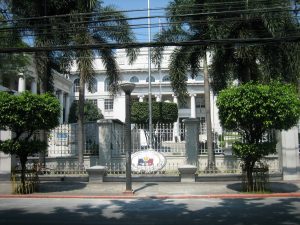An astonishing 133 Filipino lawyers have been murdered over the past four decades, more than 40 percent of them in the past six years, according to a lawyers’ group.
The statistic was announced by the National Union of Peoples’ Lawyers (NUPL) in a conference on Saturday, the Associated Press reported. It said that of the 133 murders that have occurred since 1984, 59 were slain in the six-year term of President Rodrigo Duterte.
The NUPL said that the majority of these killings have gone unsolved, and that those responsible have usually not even been identified, suggesting a high degree of impunity for those who choose to target rights lawyers and other advocates.
In March of last year, the Philippine Supreme Court condemned the uptick of violent attacks on members of the legal profession under Duterte, many of which were cases of “red-tagging,” in which administration officials imputed connections between lawyers and communist insurgents. The Court said that the attacks were having “very serious repercussions” on the rule of law, which was likely the exact intention.
“The Court condemns in the strongest sense every instance where a lawyer is threatened or killed and when a judge is threatened and unfairly labeled,” it said in a statement read by spokesman Brian Keith Hosaka.
The frequency and severity of the attacks on Philippine lawyers roughly parallels the huge number of journalists and media workers who have been murdered in the line of duty in recent decades. An estimated 195 journalists have been killed since Marcos Sr. was toppled by popular protests in 1986, and the watchdog Reporters Without Borders has described the Philippines as “one of the world’s deadliest countries for journalists.”
Given the important roles that the Fourth Estate and the judiciary play in any consolidated democracy, such horrific death tolls represent a serious qualification of the Philippines’ reputation as one of Southeast Asia’s most spirited and successful democracies. As I wrote earlier this month, following the shooting of radio broadcaster and Marcos critic Percival Mabasa, however free and fair its elections (and some have even questioned that), it remains a nation “where it is possible for the wealthy and politically connected to order the murder of a journalist – and usually to get away with it.”
While the number of journalists killed in the Philippines over the past four decades has differed little from administration to administration, the figures from the NUPL show that the Duterte years were especially deadly for lawyers. This no doubt reflects the increasing impunity associated with Duterte’s “war on drugs,” a campaign so bloody that it is the subject of an investigation at the International Criminal Court in The Hague.
As the Supreme Court pointed out last March, many of the murdered legal workers were killed while representing left-wing activists, and victims of the “war on drugs” and other human rights violations.
Duterte may no longer be in power, but President Ferdinand Marcos Jr.’s own attitude toward accountability offers few reasons to think that things will be substantially different over the next six years. While Marcos has flagged changes to the anti-drug campaign, it is much harder to see his administration leading a retrospective push for accountability. Indeed, the NUPL reported that harassment of lawyers and judges has continued under Marcos.

































